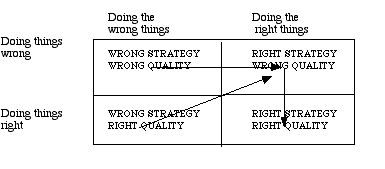
Contact Manager
Phone:
+64 21 620 456
16 Kauri Street, Woburn, Hutt City, New Zealand
email:
Manager@virtual.co.nz
 |
Service Quality requires
Customer Focus
At the heart of any service quality program is the need for every person to be 100% customer focused.
1. Understanding customers
Research is the starting point of Service Quality programs. One of the most useful ways we have found to help clients understand their customers, is to record customer focus groups and video back what customers are saying about them. This is also raw material to design the program, since it points out where major improvements are required.
2. Understanding the benefits customers are buying
The aim is to make everyone crystal clear about.the benefits being sold and what is required to astonish customers. Unless people really understand this they will find it hard to provide that special service required to stand out. As I say: "There are not many traffic jams on the extra mile."
3. Customer designed jobs
In successful programs, every job and every task is examined from the customer's point of view, to see how it adds value to the customer (external and internal customer). Achieving an attitude where, wall-to-wall, everyone thinks of their job in these terms is critical to success.
Strategic Alignment

In any organisation there is usually one market position which is likely to achieve significantly better results than any other. If the right position is chosen and a great deal of horsepower is put behind this position the organisation is highly likely to be successful. If, on the other hand, the wrong strategic positioning is chosen then the organisation is unlikely to be successful no matter how much horsepower they put into implementation.
Doing the right things is the first step, only then will quality (or doing things right) really help. The route is shown in the diagram:
Values Driven
This is the part which is most often lacking from a Service program, and a major reason for failure.
Values affect the way we behave at a very fundamental level. They are more powerful than rational thought, since no matter how much you "know" something should happen, it will not happen unless it is consistent with your values.
With common values people can trust each other to behave in acceptable and predictable ways. The only alternative is to have endless rules and procedures. These tend to limit while values tend to liberate.
Research shows high performing organisations not only hold their values with clarity but also with consensus and intensity. My personal experience at the BNZ backs up this research. From 1988 to 1992 when I was Group Strategic Planning Manager, the BNZ undertook perhaps the most progressive and ambitious values based cultural development work ever attempted in New Zealand. People like Tom Peters of "In Search of Excellence" fame took a personal interest in the Bank's progress.
The results were surprising even to those of us who intuitively knew that it would work. The energy and creativity released had to be experienced to be believed. It proved that people really want to be great; they need it; they crave to be part of a winning team, and they value the chance to contribute to the success of their company at a fundamental level.
Continuous Improvement
Service quality programs are about teams of empowered people seeking out improvements in processes and activities which simplify, standardise and improve the value to the customer. This usually involves:
1 Documentation
Excessive documentation can be dangerous If taken as an end in itself rather than a tool to improve customer service. We teach and use simple documentation based on the 'moments of truth' concept; this can be used in all areas of the organisation and is 100% customer oriented.
2 Improvement tools
We use mind mapping, nominal brainstorming techniques, and other creativity tools to increase effectiveness and efficiency.
3 Structural Issues
We advise on the organisational changes which underpin the quality service program (Quality Council, Process Teams, Policy Teams, Quality Circles). Other issues to be addressed are how these structures fit within existing management and how traditional roles will change.
4 Certification
We have a view that Certification (ISO or equivalent) is important. However it should not be seen as the reason for undertaking the program. Too many people are focused on achieving certification rather than customer focus better values and process improvement. They end up without the changes they hoped for.
5 Measurement
Measurement is critical to success. Unfortunately many of the most important aspects of business are difficult to measure. For example, client satisfaction and cultural values do not fall out of the accounting systems of many organisations. However if something is important to your Quality Service program, ways must be found to measure it's success, or progress is unlikely.


